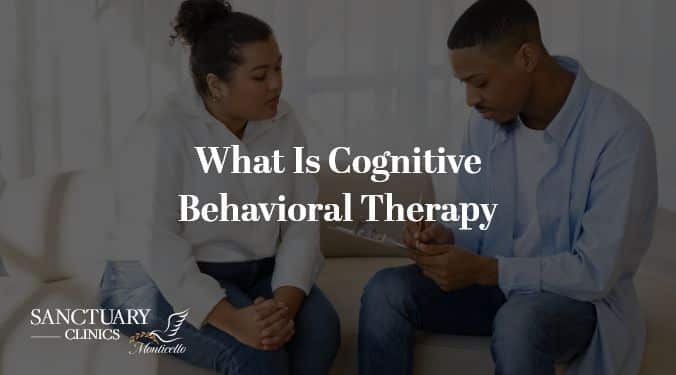Cognitive Behavioral Therapy (CBT) is a type of psychotherapy, where people engage in conversations.
Human beings are complex creatures.
We are invariably plagued by our thoughts, burdens, and unhelpful behaviors. But, CBT can help us to explore and address our negative thoughts. This form of psychotherapy is often regarded as a recent approach to psychology. However, it has actually been in existence for a long time.
Nevertheless, it is only in the last few decades that this approach has seen development and refinement. What does it do, however? It helps people overcome their psychological struggles and have a better quality of life. The intervention does so using a basic principle. It says that our behaviors and emotions are connected to each other. In essence, altering one aspect can positively impact the others.
Here, we will cover everything on CBT.
We will outline its history and effectiveness. We will also outline its numerous benefits, different types, and so on. Keep on reading.
History of Cognitive Behavioural Therapy
Cognitive Behavioral Therapy (CBT) originated in the early days of psychology in 1913. The groundbreaking contributions of John B. Watson set the foundation for progress in this field.
The roots of CBT can be found in Behaviorism. It is a theory of learning that suggests that all behaviors are acquired through conditioning.
It happens when individuals engage with their environment, influencing how they behave. The influential conditioning theories by BF Skinner also had an impact on the development of behavioral therapy.
It wasn’t until the 1960s that cognitive behavioral therapy truly came into existence. It was thanks to Dr. Aaron T. Beck’s groundbreaking work. He conducted experiments at Pennsylvania University on concepts related to psychoanalysis. Interestingly, his research uncovered the presence of thinking patterns in individuals with depression. These automatic negative thoughts could be categorized into three types:
- Self-critical thoughts
- Negative perceptions of the world
- Pessimistic views of the future
Dr. Aaron Beck introduced a method that acknowledged the connection between thoughts and actions.
Through this approach, patients are encouraged to identify and evaluate their thoughts. This allows them to understand their negative thinking patterns and correct misconceptions.
As a result, patients gradually adopt a positive outlook on life. This leads to enhanced emotional well-being. This therapeutic technique is now widely known as Cognitive Behavioral Therapy (CBT). It stems from Dr. Beck’s concept of Cognitive Therapy. His insightful observations revolutionized our understanding of depression. Moreover, it also paved the way for the development of CBT as it is practiced today.
What are the benefits of Cognitive behavioral therapy
There are many benefits of Cognitive Behavioral Therapy. Mental health conditions can make us miserable and make it difficult to go about with our daily activities. However, CBT has proven to be effective in multiple instances.
As the approach continues to develop even further, its benefits become even more apparent. Let us take a look at some of the benefits.
It Makes People Hopeful
Mental health conditions are never easy and we don’t have to tell you that. At Sanctuary Clinics, we make sure to treat mental health sufferers with the compassionate care they need.
With treatments like CBT, patients become more hopeful about their conditions. Mental health problems can make us feel like everything is the end of the world. You start feeling like there is no end to your suffering. But, this form of therapy helps to deconstruct such thoughts.
CBT essentially helps to make patients realize that their thoughts are not always accurate. They are simply their thoughts and by challenging them, patients can learn to move forward.
Get Help Today.
We are here to help you through every aspect of recovery.
Let us call you to learn more about our treatment options.
We are here to help you through every aspect of recovery. Let us call you to learn more about our treatment options.
It Makes People More Confident With Themselves
Mental health and self-esteem are highly related. Numerous mental health conditions are often linked to diminished self-esteem. This fuels a cycle where negative thoughts impact behaviors and vice versa.
Nonetheless, CBT can intervene in this cycle. It can empower you to cultivate greater self-assurance in your capabilities.
With CBT, you grasp the mechanics of your thoughts and recognize your ability to steer them. As a result, your entire set of beliefs undergoes a transformation, including how you perceive yourself.
It Makes People More Relaxed
Mental health conditions and their symptoms can sometimes be aggravating. We may not know how to react to them and end up lashing out.
However, CBT helps patients to manage their symptoms with a relaxed mindset. The approach uses many relaxation techniques to make sure that the patients deal with their emotions correctly.
It Makes People Think and Act Rationally
One of the major symptoms of mental health conditions is that it makes us act less rationally. However, CBT offers a significant advantage by empowering us to take charge of our thought patterns. Often, cognitive distortions become habitual, surfacing without our conscious examination.
However, by substituting negative thoughts, our cognitive landscape can undergo a remarkable shift. Instead of allowing negativity to dictate our reactions, we gain the ability to think logically.
This way, we get to respond thoughtfully to challenging circumstances.
What are types of Cognitive behavioral therapy
There are many types of Cognitive Behavioral Therapy. Mental health conditions come in different types, which means the methods for treating them also differ largely. Depending on how severe the condition is, different types of therapy are administered. Let us take a look at some of the types of Cognitive Behavioral Therapy.
Emotive Behavior Therapy
The focus of Emotive Behavior Therapy is on identifying and challenging irrational beliefs. This therapy helps to fight ideas that contribute to negative emotions and behaviors. These beliefs are often rooted in childhood experiences or cultural conditioning. More importantly, they can be difficult to identify and change without the help of a trained therapist.
During EBT sessions, the therapist works with the client to identify these beliefs. The aim is to challenge them using a variety of techniques.
Dialectical Behavior Therapy (DBT)
Dialectical behavior therapy (DBT) is another well-supported form of cognitive therapy. It employs problem-solving techniques and encourages embracing acceptance.
DBT has proven effective in addressing intense emotions and serious mental health conditions. Individuals who benefit from DBT often perceive situations in absolutes, seeing them as either one way or another. They perceive things without recognizing the middle ground or nuances. If you find yourself lacking coping skills and frequently facing crises, DBT may be valuable.
It can help in equipping you with effective coping strategies. It helps you develop a more resilient approach to challenges.
Rational-Emotive Behavior Therapy (REBT)
Rational-Emotive Behavior Therapy (REBT) revolves around pinpointing irrational beliefs. It helps in engaging in proactive questioning of these notions.
It ultimately helps to acquire the skill to acknowledge and transform these cognitive patterns.

Can Cognitive behavioral therapy help people with mental health conditions?
Yes, Cognitive Behavioral Therapy can help people with mental health conditions. Various studies have highlighted its effectiveness in addressing different conditions. Be it depression, anxiety disorders, PTSD, or others, CBT has shown a decent success rate.
The key to CBT’s success lies in its emphasis on recognizing and changing thought patterns and behaviors.
The method aims to reconstruct thoughts that contribute to ineffective coping strategies. Typically, CBT is administered through either group therapy or individual sessions. It can be tailored to meet the requirements and behavior patterns of each individual.
According to a meta-analysis conducted by Stefan G. Hofmann in 2012, CBT is highly effective. This analysis carefully examined 269 studies evaluating CBT’s impact on disorders.
The findings showed that CBT was highly successful in alleviating symptoms across a range of health conditions. The conditions included depression, generalized anxiety disorder, and panic disorder. CBT also helped with social anxiety disorder and PTSD. Ultimately, this study emphasized the evidence-based nature of CBT. It concluded CBT as a treatment option for psychological challenges.
How long does it take for Cognitive behavioral therapy to work?
It is difficult to determine how long it will take for Cognitive Behavioral Therapy to work. The reason is simple: every individual is different.
The way the patients respond to the psychological treatment also differs. Moreover, it also depends on what kind of mental health condition you are looking to treat. All things combined, it becomes tricky to determine the period of time needed for treatment.
That being said, Cognitive behavior therapy typically follows a short-term treatment approach. It consists of approximately 5 to 20 sessions.
However, the duration may vary depending on your individual requirements and circumstances. Sometimes, it might even be longer. Your therapist will work with you to determine the most effective length of treatment. The length will be based on factors such as:
- Your specific needs
- The nature of your condition or situation,
- The severity and duration of your symptoms,
- The pace of your progress,
- The level of stress you experience,
- And the support you receive from your loved ones.
Together, you and your therapist will tailor the CBT process to suit your unique journey toward positive change and growth. Your therapist will determine the best therapeutic approaches for you and guide your journey.
What is the success rate of Cognitive behavioral therapy?
The success rate of Cognitive Behavioral Therapy varies between 50-70%. When it comes to individual experiences, it becomes difficult to specify a particular success rate. Everyone’s experience is different.
Moreover, the success rate for treating different mental health conditions may also differ. Research has shown that while CBT might work excellently for some conditions, it may not work as effectively in other conditions.
Cognitive behavior therapy, much like most therapies, is highly individualized. What may have worked for many, may not always work for you.
It also depends on the treatment used and the quality of care received. The therapist or mental health professional must be trained in offering psychological therapies. At Sanctuary Clinics, we make sure that all the patients get the utmost amount of mental health care.
The effectiveness of CBT has been proven in multiple studies. Let us go over a few of them.
- According to a study by Agras WS, Fitzsimmons-craft EE, CBT is highly effective for eating disorders.
- According to a study by JM Trauer, CBT can be highly effective in treating insomnia.
- Another research conducted by J Carpenter has shown that CBT is one of the leading treatments for anxiety.
What disorders does cognitive therapy treat?
Cognitive therapy helps to treat a wide range of mental health conditions. Let us take a look at some of the conditions it helps to treat.
Post-Traumatic Stress Disorder (PTSD)
CBT is a valuable treatment for patients with Post-Traumatic Stress Disorder (PTSD). It helps to challenge negative thoughts. In doing so, CBT helps develop a balanced perspective on the traumatic event. This ultimately helps to reduce fear and anxiety.
Exposure therapy allows individuals to safely confront and process traumatic memories. It helps to decrease avoidance behaviors. Those with PTSD often do not want to revisit their experiences.
However, CBT provides a safe space to confront their past experiences. CBT also aids in processing trauma. This helps to foster healing and prevent relapses.
Bipolar Disorder
CBT can also help with bipolar disorder. CBT helps people recognize and challenge negative thought patterns during depressive episodes. This helps to reduce feelings of hopelessness and despair.
During manic episodes, CBT helps in identifying impulsive behaviors. It helps patients to develop strategies to maintain stability. It also focuses on enhancing coping skills to manage stress and prevent mood shifts.
It helps to promote regular routines and address cognitive distortions. In doing so, CBT equips individuals with a greater sense of control over their emotions and life.
Obsessive-Compulsive Disorder (OCD)
CBT is effective for Obsessive-compulsive Disorder (OCD) too. It helps to challenge and restructure obsessive thoughts.
Those who have OCD tend to keep repeating the same tasks and have obsessive patterns of thinking. OCD can be a very aggravating medical condition, disrupting the daily activities of patients.
However, CBT gives them the power to confront their fears. In this way, they get to have a decreased reliance on rituals. With consistent practice, CBT empowers individuals to regain control over their behaviors. It helps to reduce severe symptoms and improve their ability to engage in daily life without overwhelming distress.
Depressive Disorders
CBT has also been shown to be effective for depression. It helps individuals identify and challenge negative thought patterns. It helps patients to have a more balanced and realistic perspective. CBT also focuses on behavioral action. This means it encourages people to engage in activities that will bring them pleasure and a sense of accomplishment.
CBT equips individuals with practical tools to break the cycle of depression. In the process, individuals can foster positive changes and improve overall mood and functioning.
Generalized Anxiety Disorder (GAD)
Cognitive behavioral therapy can also help with Generalized Anxiety Disorder (GAD). CBT helps individuals recognize and challenge excessive worries and anxious thoughts.
Anxiety can be an overwhelming disorder, but CBT helps to deconstruct anxious thoughts and take back our minds. Relaxation and mindfulness techniques are taught to manage symptoms of anxiety.
CBT doesn’t only address anxiety on the surface but it tries to find out the root causes of anxiety. With the help of CBT, people can learn to reframe their thinking and reduce catastrophic thinking patterns.
Get Help Today.
We are here to help you through every aspect of recovery.
Let us call you to learn more about our treatment options.
We are here to help you through every aspect of recovery. Let us call you to learn more about our treatment options.









